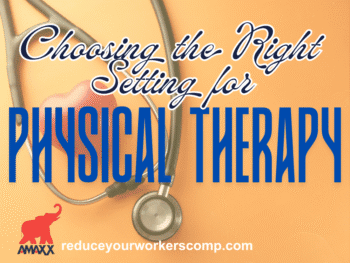If you are like me, you were never quite sure what durable medical equipment was …
“Durable Medical Equipment” is Medicare and Social Security terminology adopted into the workers’ compensation vocabulary of most states. According to Medicare, durable medical equipment must be necessary on the basis of the individual’s medical and physical condition, be used in the injured employee’s home* (home includes a long-term medical institution) and be reusable. If it is not reusable, it is not considered durable medical equipment (with a few exceptions).
For this discussion, we will look at durable medical equipment and its use in workers’ compensation. To better understand what qualifies as durable medical equipment, the following are some examples:
Click Link to Access Free PDF Download
“The 6-Step Process To Determine Workers’ Comp Injury Causation”
*However, be aware, Medicare is disinclined to pay for these items if it’s the intent of the user to use these items primarily to take a spin around the mall, i.e., outside usage. Albeit, if usage is primarily for the home, then the item certainly can be used outside the home also.
- Transcutaneous electronic nerve stimulators (TENS units)
- Prosthetics and orthotics
- Iron lungs
- Oxygen tents, oxygen tanks and other breathing apparatuses
- Ventilators
- Hospital beds
- Air beds or air fluidized beds
- Wheelchairs, whether motorized or not, including power chairs and scooters
- Crutches, canes and walkers
- Nebulizers
- Infusion pumps (and some of the medicines used in them
- Suction pumps
- Continuous positive airway pressure machines
- Blood-glucose monitors (and the strips used in them)
- Chair lifts
- Patient lifts
- Commode chairs
Any medical equipment the employee would use repeatedly in the home because of medical necessity would be considered durable medical equipment.
Medical supplies like disposable gloves, bandages, gauze, catheters, needles and irrigating kits which can be used at home are not considered durable medical equipment as they are designed for one time use.
Before approving any durable medical equipment, the workers’ comp adjuster should ask themselves:
- Is the equipment customarily used to serve a medical need?
- Can the equipment be used correctly in the home?
- Would the equipment be necessary if the employee was not injured?
Depending on the answers to these questions, the adjuster will accept or deny payment for durable medical equipment.
In some liberal workers’ comp jurisdictions, the term durable medical equipment has been expanded to include:
- Hot tubs
- Spas
- Whirlpools
- Swimming pools
- Exercise equipment
- Household recliner chairs
- Hearing aids
- Air conditioners
- Dehumidifiers
We recommend a knowledgeable workers’ compensation defense attorney in your state be consulted before accepting any request for these items to be paid for by workers’ compensation insurance.
When the medical provider recommends durable medical equipment, the nurse case manager (NCM) or the workers’ comp adjuster if there is no NCM, needs to review the medical diagnosis and the medical prognosis to ascertain the medical necessity for the durable medical equipment. The durable medical equipment must be considered reasonable and must be needed for the injured employee for specialized use in the employee’s home or long-term care institution.
The question is sometimes asked by new workers’ comp adjusters as to how to classify durable medical equipment—should it be paid from the medical reserve or should it be paid from the expense reserve. Most insurers and third party administrators will pay for durable medical equipment from the medical reserves, as the purpose of the durable medical equipment is to provide for the medical needs of the employee.
If the need for the equipment will be short-term, the durable medical equipment should be rented or leased. If the need for the equipment will be long-term, an analysis of the rental cost versus the purchase cost should be completed to determine the best option.
Fortunately, durable medical equipment is not needed on most workers’ comp claims. When it is needed,
there are various companies specializing in providing durable medical equipment. If the equipment is necessary to assist the employee during their recovery from the accident, the adjuster should verify its necessity and determine whether it is better to rent or buy the equipment for the injured employee.
Author Rebecca Shafer, J.D./ Amaxx, President, Amaxx Risks Solutions, Inc. has worked successfully for 20 years with many industries to reduce Workers’ Compensation costs, including airlines, healthcare, printing/publishing, pharmaceuticals, retail, hospitality and manufacturing. Contact: RShafer@ReduceYourWorkersComp.com or 860-553-6604.
WC Calculator: http://www.LowerWC.com/calculator.php
TD Calculator: http://www.LowerWC.com/transitional-duty-cost-calculator.php
Do not use this information without independent verification. All state laws vary. You should consult with your insurance broker or agent about workers’ comp issues.
©2010 Amaxx Risk Solutions, Inc. All rights reserved under International Copyright Law.



























It’s good to know that people take medical equipment seriously! It would be bad if you didn’t have very durable equipment. If you do have durable equipment then you don’t need to worry about any issues with it.